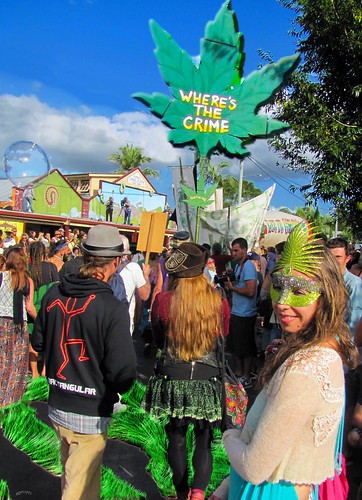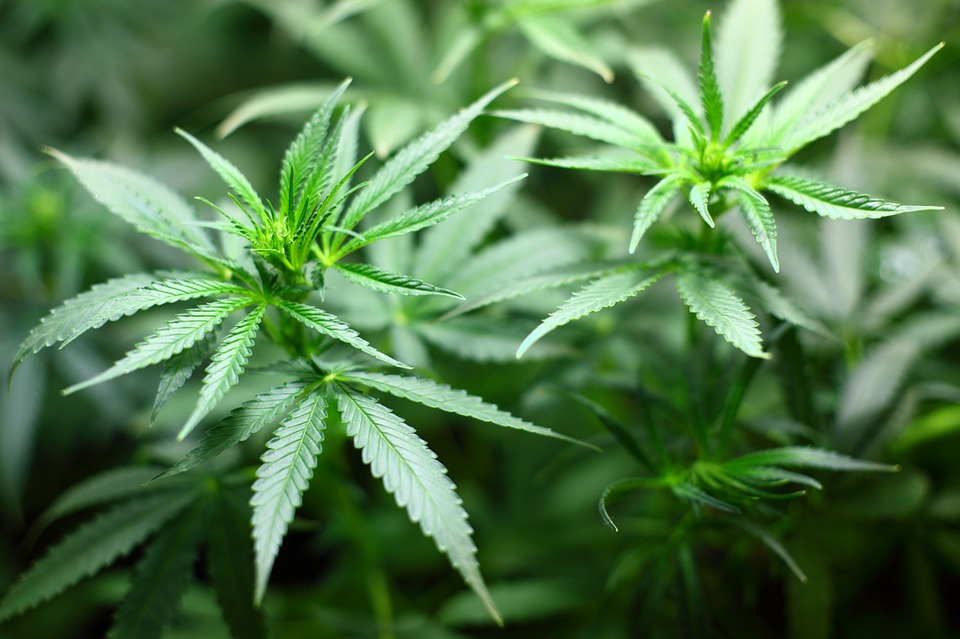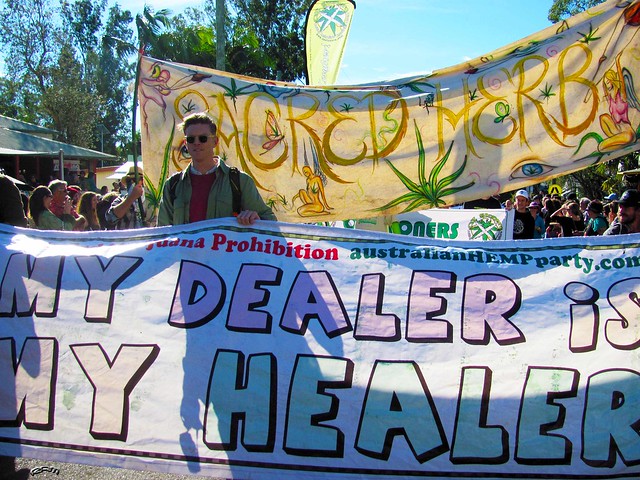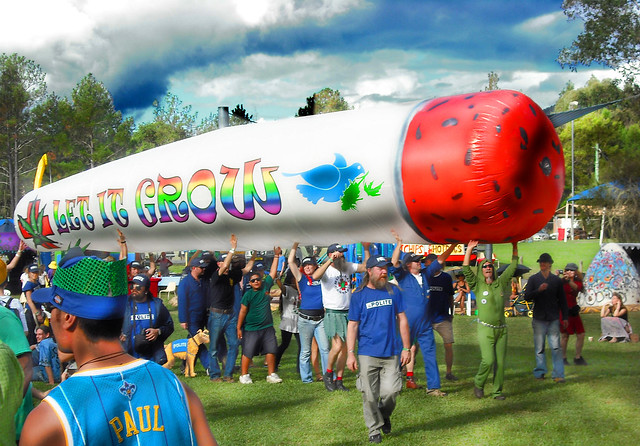5 Debunked Marijuana Myths the State Uses to Keep US in
the Stone Age
There’s a movement underway in America. It involves changing the way Americans view a federally designated controlled substance it classifies as a Schedule I narcotic. Over the last few years, twenty-nine U.S. states have now acted against the federal government’s ban on marijuana, and have voted to legalize cannabis for either medicinal or recreational purposes.
But even with so many Americans voting against the long-standing federal ban on a natural, healing herb, a plant no-less, much misconception still abounds with respect to marijuana, its users, and the impact it has on society. In the following essay, a close examination of the claims against cannabis will be examined, and hopefully, in the end, a better understanding will take place, and myths long associated with cannabis use will finally be dispelled.
Misconception
Number 1 – Cannabis (marijuana) is a Gateway Drug
It’s been said so much it may seem like an immutable fact, “Marijuana is a gateway drug.” But nothing could be further from the truth. According to one research study (Morral, 2002) which sought to examine the available research theorizing cannabis to be a gateway drug, marijuana users were only likely to try harder drugs if they were offered those drugs by a friend or a dealer, for example. The researchers concluded, “something like a marijuana gateway effect probably does exist, if only because marijuana purchases bring users in contact with the black market that also brings increases access to hard drugs.”
In other words, the researchers concluded since marijuana is illegal for most purchasers, even purchasers where marijuana may be legal (whose users may not be card carrying medicinal marijuana licensed users), those who are seeking marijuana may find themselves faced with temptation to use harder drugs because street dealers will sell them any drug they may be peddling.
The researchers concluded that only a “tiny fraction” of marijuana users are at risk for turning to harder drugs, simply because those said individuals have a propensity to experimenting with those harder drugs. With those conclusions in mind, being able to regulate marijuana like alcohol, even allowing for it to be purchased for recreational use, will permit cannabis users and those wishing to experiment with cannabis to come in contact with just marijuana, not the other harder drugs found on the street.
Proponents of marijuana foresee a day where it’s sold only at tightly regulated dispensaries and believe that a legal system is the only real and effective way to combat the criminal black market. Such dispensaries provide a safe place to do business, free from the shame and stigma of “buying drugs off the street” and away from the availability of harder drugs such as cocaine and heroin.
Misconception
Number 2 – Marijuana Use Leads to More Traffic Fatalities
 Citing the National Highway
Traffic Safety Association, Forbes reported that not only
is marijuana use safer than alcohol use when it comes to driving, but far fewer
fatalities are recorded when marijuana is present than when alcohol is present
in traffic fatality instances. “It looks like marijuana’s impact on traffic
safety has been greatly exaggerated,” writes Forbes.
Citing the National Highway
Traffic Safety Association, Forbes reported that not only
is marijuana use safer than alcohol use when it comes to driving, but far fewer
fatalities are recorded when marijuana is present than when alcohol is present
in traffic fatality instances. “It looks like marijuana’s impact on traffic
safety has been greatly exaggerated,” writes Forbes. There’s no question marijuana use impairs a person’s ability to operate a vehicle, especially when the drivers are young and male. But in Colorado, where recreational marijuana is currently legal, driving under the influence (DUI) citations are on the decline, as reported by the Denver Post, and highway fatalities are at an historic low, according to The Washington Post.
Compared to alcohol, which is legal in all 50 states, cannabis is much safer. Forbes writes, “a 2015 National Highway Traffic Administration (NHTSA) study…found no statistically significant association between marijuana use and crash risk once the researchers adjusted for confounding variables (such as the aforementioned age and sex). The explanation for this difference may be that the NHTSA analysis included any drivers who tested positive for active THC, whether or not they were still feeling the effects.”
Given these statistics, one might hypothesize that if those who are currently drinking and driving, would give up alcohol, and use marijuana instead, driving under the influence fatalities might further diminish. However, more research into that theory should be undertaken before any such conclusion could be drawn.
Misconception
Number 3 – Marijuana Use Increases Crime Rates
Actually, the “War on Drugs” produces more criminals than the substances do, according to one recent editorial. Fox News’ John Stossel addressed the issue of drugs and violence saying, “Violent? People who get high are rarely violent. The violence occurs because when something’s illegal, it is sold only on the black market. And that causes crime. Drug dealers can’t just call the cops if someone tries to steal their supply. So they form gangs and arm themselves to the teeth.” Some police officers agree. Neil Franklin, a 33-year veteran police officer from Maryland used to kick down doors during drug raids and admitted he used to feel that drugs made people violent.
 Franklin now
is a proponent for ending the prohibition against cannabis, leading the group
known as LEAP, Law Enforcement Against Prohibition. “It must be difficult to be
an opponent of marijuana reform. They can’t make arguments against legalization
based on logic and facts so they must constantly resort to fear-based
hypotheticals and anecdotes that keep getting proved wrong by systematic study.
I feel for them. I really do,” he said.
Franklin now
is a proponent for ending the prohibition against cannabis, leading the group
known as LEAP, Law Enforcement Against Prohibition. “It must be difficult to be
an opponent of marijuana reform. They can’t make arguments against legalization
based on logic and facts so they must constantly resort to fear-based
hypotheticals and anecdotes that keep getting proved wrong by systematic study.
I feel for them. I really do,” he said. Citing a longitudinal research study by the University of Texas, Dallas, LEAP maintains where marijuana is legal, the crime rates for homicides and assault are slightly lower. Franklin told Stossel, “We have the violence of these gangs competing for market share, and people get hurt.” He added the current police tactics in the war on drugs are ineffective and actually create more war on drug victims. “Drugs can be — and are in many cases — problematic,” he told Stossel adding, “But the policies that we have in place to prohibit their use are 10 times more problematic.”
When police officers decide to start busting down doors in a frenetic search for drugs, “We end up with kids being shot … search warrants being served on the wrong home, innocent people on the other side of the door thinking that they are protecting their home,” he stated lamenting his role in police raids. Stossel indicated that legalizing all drugs, following the example set by the country of Portugal, might actually reduce drug addiction and end the notion that police officers and modern day policing are the enemies, allowing law enforcement to focus their attentions on real crime and hardened criminals.
The failure of the war on drugs may best be described by USA Today’s editorial board. “With an average 78 Americans dying each day from overdoses of prescription opioid painkillers and heroin, it’s clear that the U.S. is losing the war on drugs. The epidemic has spread to suburbia and rural areas. The death toll from heroin has more than tripled since 2010. And the nation is desperate for answers,” they write.
The truth is that the real drug killers of Americans are powerful prescription pain pills, opiates, and as The Free Thought Project has faithfully reported, their abuse has reached epidemic levels, now accounting for more fatalities than car accidents. All the while, marijuana is showing promise as a much safer alternative for pain than deadly opiates. In fact, in states where marijuana is legalized in some form, opiate deaths have plummeted.
Misconception
Number 4 – The Tax Money Legal Marijuana Generates Never Makes It to Schools
According to one pro-marijuana legalization advocacy group, citing the Colorado Department of Revenue’s marijuana statistics, “the regulated marijuana market generated more than $156 million in state tax revenue and license fees in FY 2015-2016, including $40 million in tax revenue for school construction projects — fulfilling the promise of Amendment 64 — plus an addition $2.45 million also earmarked for public schools. These figures do not include local taxes and fees (e.g. Denver).”
If the schools never see a dime of the revenue being brought in from legal medical and recreational marijuana sales, it may be due to legislative appropriation and not revenue generation. In other words, the money’s coming in, but citizens must be vigilant to ensure lawmakers simply don’t spend it for some other purpose than in schools and education.
Misconception
Number 5 – Cannabis is Addictive and Legalization Will Lead To More Deaths From
Overdose, Cancer, and Violence
“Millions of Americans have tried marijuana, but most are not regular users [and] few marijuana users become dependent on it … [A]lthough [some] marijuana users develop dependence, they appear to be less likely to do so than users of other drugs (including alcohol and nicotine), and marijuana dependence appears to be less severe than dependence on other drugs,” concluded a federal study conducted by the National Academy of Sciences Institute of Medicine. Drug treatment facilities also know this. While it is possible for one to seek treatment for cannabis dependence, few drug treatment facilities will even consider admitting someone if their drug of choice is cannabis
There’s a reason why stoners “chill” when they smoke weed. It’s because cannabis relaxes its users, who are much less likely to become violent while stoned. One research study concluded cannabis use “reduces likelihood of violence” and concluded “alcohol is clearly the drug with the most evidence to support a direct intoxication-violence relationship”. Put simply, your town drunk is more likely to pick a fight with you than your neighborhood pothead is.
According to one source, “The U.S. Centers for Disease Control and Prevention (CDC) reports that more than 30,000 annual U.S. deaths are attributed to the health effects of alcohol (i.e. this figure does not include accidental deaths). On the other hand, the CDC does not even have a category for deaths caused by the health effects of marijuana. A study published in Scientific Reports in January 2015 found that the mortality risk associated with marijuana was approximately 114 times less than that of alcohol.” Going further, “there has never been a case of an individual dying from a marijuana overdose. Meanwhile, the CDC attributes more than 1,600 U.S. deaths per year to alcohol poisoning.” Alcohol has been known to cause cirrhosis of the liver as well. But weed works as an anti-inflammatory, and a natural anti-depressant, potentially much safer than the selective serotonin re-uptake inhibitors (SSRIs), and carries no black box warning label like they do.
As far as cancer is concerned, the organization Regulate Marijuana Like Alcohol stated,
Alcohol use is associated with a wide variety of cancers, including cancers of the esophagus, stomach, colon, lungs, pancreas, liver and prostate. Marijuana use has not been conclusively associated with any form of cancer. In fact, a 2009 study contradicted the long-time government claim that marijuana use is associated with head and neck cancers. It found that marijuana use actually reduced the likelihood of head and neck cancers.
If you are concerned about marijuana being associated with lung cancer, you may be interested in the results of the largest case-controlled study ever conducted to investigate the respiratory effects of marijuana smoking and cigarette smoking. Released in 2006, the study, conducted by Dr. Donald Tashkin at the University of California at Los Angeles, found that marijuana smoking was not associated with an increased risk of developing lung cancer. Surprisingly, the researchers found that people who smoked marijuana actually had lower incidences of cancer compared to non-users of the drug.
So there you have it! Armed with these facts and more, proponents of the legalization of cannabis can take their case to the court of public opinion and win over the jury of their peers, swaying the population to embrace marijuana as medicine for a whole host of illnesses. Those who are sitting cautiously on the fence, waiting to draw their own conclusions now have more research studies to ponder. And proponents of continuing the decades-long prohibition of cannabis no longer have a leg to stand on.
From The Free
Thought Project @ http://thefreethoughtproject.com/five-marijuana-myths-debunked/
For more information about marijuana see http://nexusilluminati.blogspot.com/search/label/marijuana
- Scroll down
through ‘Older Posts’ at the end of each section
Do you LIKE this uniquely informative site?
A genuinely incapacitated invalid maintains, writes, edits,
researches, illustrates, moderates and publishes this website from a tiny cabin
in a remote forest.
Now that most people use ad blockers and view these posts
on phones and other mobile devices, sites like this earn an ever shrinking
pittance from advertising sponsorship.
This site could really use your help.
Like what you see? Please give anything you can -
Contribute any amount and receive at least one New Illuminati eBook!
(You can use a card securely if you don’t use Paypal)
Please click below -
And it costs nothing
to share this post on Social Media!
Dare to care and
share - YOU are our only advertisement!
Images - http://www.activistpost.com/wp-content/uploads/2016/12/seedling-1062908_960_720.jpg
Nimbin mardi Grass images by R. Ayana – https://c1.staticflickr.com/3/2877/13870347983_8c21666640_k.jpg
For further enlightening
information enter a word or phrase into the random synchronistic search box @
the top left of http://nexusilluminati.blogspot.com
And see
New Illuminati – http://nexusilluminati.blogspot.com
New Illuminati on Facebook - https://www.facebook.com/the.new.illuminati
New Illuminati Youtube Channel - https://www.youtube.com/user/newilluminati/playlists
New Illuminati’s OWN Youtube Videos
-
New Illuminati on Google+ @ For
New Illuminati posts - https://plus.google.com/u/0/+RamAyana0/posts
New Illuminati on Twitter @ www.twitter.com/new_illuminati
New Illuminations –Art(icles) by
R. Ayana @ http://newilluminations.blogspot.com
The Her(m)etic Hermit - http://hermetic.blog.com
DISGRUNTLED SITE ADMINS PLEASE NOTE –
We provide
a live link to your original material on your site (and links via social
networking services) - which raises your ranking on search engines and helps
spread your info further!
This site
is published under Creative Commons (Attribution) CopyRIGHT (unless an
individual article or other item is declared otherwise by the copyright
holder). Reproduction for non-profit use is permitted & encouraged - if you
give attribution to the work & author and include all links in the original
(along with this or a similar notice).
Feel free
to make non-commercial hard (printed) or software copies or mirror sites - you
never know how long something will stay glued to the web – but remember
attribution!
If you
like what you see, please send a donation (no amount is too small or too large)
or leave a comment – and thanks for reading this far…
Live long
and prosper! Together we can create the best of all possible worlds…
From the New Illuminati – http://nexusilluminati.blogspot.com








